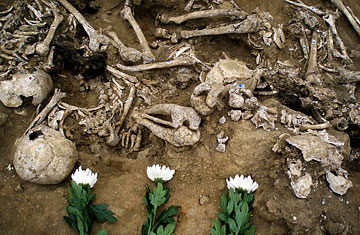
Chrysanthemums placed before human remains unearthed in Oegongri, 170 miles southeast of Seoul
On a cold February night in 1951, South Korean troops moved swiftly to take a communist guerrilla stronghold on Bulgap Mountain, at a county called Hampyeong in the Korean peninsula's southwest corner. By the time they scaled the ridge, the rebels had fled. That's when the bloodshed began. Suspecting the villagers in the area had helped the enemy, the soldiers made them kneel in a trench, then shoved sharpened bamboo sticks down their throats and shot them.
Nearly 60 years later, excavators working for South Korea's Truth and Reconciliation Commission have been unearthing remains there and at 11 other mass graves from the Korean War. By piecing together and acknowledging the massacres, they say, South Koreans can finally put a dark chapter in history to rest — and the evidence can help victims seek compensation from the government. The commission, however, does not have the power to arrest the perpetrators.
But time is running short, and the group, formed in 2005 under the liberal administration of Roh Moo Hyun, has run into political opposition. Starting in December, conservative President Lee Myung Bak, the National Assembly and the Chief Justice of the Supreme Court will appoint the group's new leaders, who could choose to not renew its controversial mandate or diminish it. That wouldn't be a surprise; in the past two years, victims have lost three separate lawsuits demanding compensation from the government. "I lost my family at the hands of the government, but they have not compensated me at all for my suffering," says Jung Jung Hee, 76, who barely survived another massacre, also near Bulgap, during the war. "It's so unfair."
From 1950 to 1953, communist forces from North Korea and the military-run South fought one of the bloodiest civil wars of the 20th century, leaving more than 2 million civilians dead. Troops from both sides carried out mass executions. But after the Korean War ended, a succession of military dictators through the 1980s in the South suppressed the accounts; those who suggested South Korean forces might have executed innocents — and even family members who exhumed their relatives for proper burials — were harassed or arrested for being communist sympathizers.
For decades, historians have relied on written and oral accounts to pinpoint the killings, but it wasn't until the commission began gathering forensic evidence in 2005 that the scope of each massacre became clearer. The South Korean military, for example, claimed in reports that more than 1,000 "communist guerrillas" were killed at Bulgap Mountain that night in February. But the excavation tells a different story. Investigators found 133 intact skeletons bending their knees and clutching their fingers behind their skulls — 21 were under 16 years old and nonmilitary artifacts like toys and hairpins were found, indicating the people were civilians not involved in the fighting. "As we can see, the military reports were manipulated," says Park Sun Ju, chief of the excavating team. The group has also investigated American carpet bombings used to rout communist forces during the war, a practice it claims killed thousands of civilians.
But the feeling that airing the army's war crimes is against the nation's best interest has not disappeared. Critics accuse the commission itself of manipulating the facts. In May, the group reopened one investigation after a victims' association filed a complaint about a report. The victims' families claimed that North Korean soldiers participated in executing 273 civilians in one county on the west coast — contrary to the commission's statements that said the perpetrators were exclusively members of the South Korean army. Some say questionable proclamations like these reflect a political bias. "Many of the commissioners are ... people who have a historical vendetta against the South Korean government," says Shin Ji Ho, a lawmaker in the conservative Grand National Party (GNP), who helped the victims file the complaint. In 2005, Shin was part of a group of 13 conservative lawmakers who drafted a law that combined many earlier truth commissions into the one now. Critics charged this as a move to limit the investigations. Shin adds that the mandate should not be renewed when it expires in April.
Truth commissions, which are set up by governments to let victims and perpetrators tell their stories without fear of retribution, have run into similar resistance around the world. In 2001, ethnic-minority lawmakers in the former Yugoslavia complained that a short-lived truth commission had appointed too many majority Serbs, which, they argued, was an inappropriate demographic to investigate massacres of minorities that took place during the 1990s. Some victims in South Africa claimed that nation's truth commission — set up to investigate massacres and disappearances of the country's majority blacks in the second half of the 20th century, and widely considered a model for future ones — was politically convenient, so former leaders who committed rights abuses would not be jailed.
Truth commissions do not charge people with crimes; they only reveal facts based on excavations and testimonies that in theory allow the victims to move on. But the South Korean project poses a unique problem. Formed a half-century after the war, many victims and perpetrators have already died, complicating the processes both of fact-finding and bringing justice. Critics have questioned the value of delving so deeply into a violent era, after South Korea has already moved on to become one of the world's wealthiest democracies. Still, the long-hidden information about tactics used in a brutal war has been coming into focus, and many believe it's helping a society heal from scantily bandaged wounds. "Once the brutal facts of these massacres are out in the public, it's very hard for any government ... to get this information covered up again," says Bruce Cumings, a professor of Korean history at the University of Chicago. "President Lee's administration is trying to get a lot of toothpaste back into the tube."
— With reporting by Hong Seok-joon / Seoul
